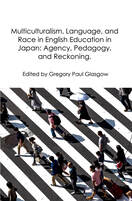Chapter 5: Being a Filipino English Teacher in Japan: A Study of Identity and Agency by Marife Caripo and Alison Stewart
Abstract
With the expansion of English teaching in compulsory education in Japan, as well as changes to the labour law and shifts in public opinion on who should teach English, there has been a sharp increase over the past decade in the number of Filipinos working as English teachers and Assistant English Teachers (ALTs). There has been little research on this group of teachers, but the studies that have been conducted raise questions about the continued prevalence of racialized native-speakerism affecting Filipinos who teach English in Japan. This chapter addresses this issue by shedding light on the salience of Filipino identity and the constraints it may or may not place on these teachers’ agency. The authors conducted a diary study with eight (8) Filipino teachers at the start of the school year and follow-up interviews with four of these participants. Findings suggest that although there were no instances of outright racism in the classroom, the participants all felt under pressure to outperform ‘native speakers’ and “prove” their worth as English teachers in a competitive and precarious employment market.
About the Contributors
Marife Carpio is a teacher at Ritsumeikan Junior and Senior High School. She completed her PhD in Humanities at Osaka University and her undergraduate studies at the University of the Philippines. Her interests are in educational communication, ICT integration in EFL, and lifelong learning. She has served as president of Filipino Language Teacher in Japan Global (FETJ-Global), where she uses her skills and knowledge to contribute to members’ professional development.
Alison Stewart taught in Japan for 28 years before retiring from Gakushuin University in 2022. Her association with Filipino teachers through the teaching association, Filipino Language Teacher in Japan Global (FETJ-G), stretches back over a decade and she has written and presented her research extensively on and with these teachers. Her recent monograph, Language Teacher Recognition: Narratives of Filipino English Teachers in Japan was published in 2020 by Multilingual Matters.
Citation
Carpio, M., & Stewart, A. (2022). Being a Filipino English teacher in Japan: A study of identity and agency. In Glasgow, G. P. (Ed.), Multiculturalism, language, and race in English education in Japan: Agency, pedagogy, and reckoning (pp. 133–155). Candlin & Mynard ePublishing. https://doi.org/10.47908/26/5
With the expansion of English teaching in compulsory education in Japan, as well as changes to the labour law and shifts in public opinion on who should teach English, there has been a sharp increase over the past decade in the number of Filipinos working as English teachers and Assistant English Teachers (ALTs). There has been little research on this group of teachers, but the studies that have been conducted raise questions about the continued prevalence of racialized native-speakerism affecting Filipinos who teach English in Japan. This chapter addresses this issue by shedding light on the salience of Filipino identity and the constraints it may or may not place on these teachers’ agency. The authors conducted a diary study with eight (8) Filipino teachers at the start of the school year and follow-up interviews with four of these participants. Findings suggest that although there were no instances of outright racism in the classroom, the participants all felt under pressure to outperform ‘native speakers’ and “prove” their worth as English teachers in a competitive and precarious employment market.
About the Contributors
Marife Carpio is a teacher at Ritsumeikan Junior and Senior High School. She completed her PhD in Humanities at Osaka University and her undergraduate studies at the University of the Philippines. Her interests are in educational communication, ICT integration in EFL, and lifelong learning. She has served as president of Filipino Language Teacher in Japan Global (FETJ-Global), where she uses her skills and knowledge to contribute to members’ professional development.
Alison Stewart taught in Japan for 28 years before retiring from Gakushuin University in 2022. Her association with Filipino teachers through the teaching association, Filipino Language Teacher in Japan Global (FETJ-G), stretches back over a decade and she has written and presented her research extensively on and with these teachers. Her recent monograph, Language Teacher Recognition: Narratives of Filipino English Teachers in Japan was published in 2020 by Multilingual Matters.
Citation
Carpio, M., & Stewart, A. (2022). Being a Filipino English teacher in Japan: A study of identity and agency. In Glasgow, G. P. (Ed.), Multiculturalism, language, and race in English education in Japan: Agency, pedagogy, and reckoning (pp. 133–155). Candlin & Mynard ePublishing. https://doi.org/10.47908/26/5

Information About the Book
Title: Multiculturalism, Language, and Race in English Education in Japan: Agency, Pedagogy, and Reckoning
Editor: Gregory Paul Glasgow
Publication date: March 2023
Read more...
Title: Multiculturalism, Language, and Race in English Education in Japan: Agency, Pedagogy, and Reckoning
Editor: Gregory Paul Glasgow
Publication date: March 2023
Read more...
